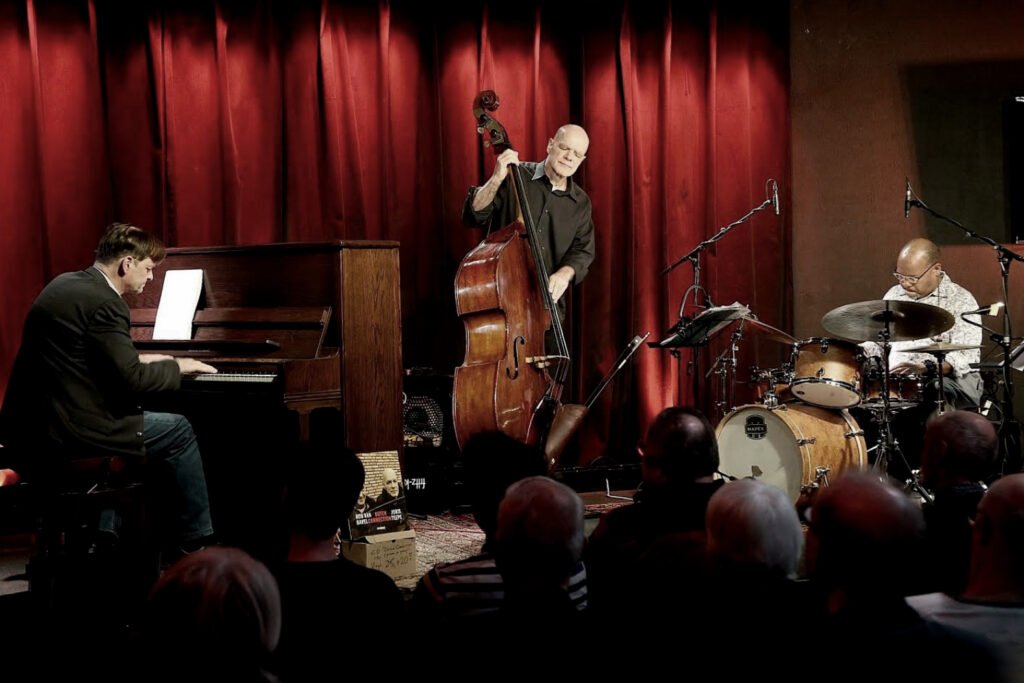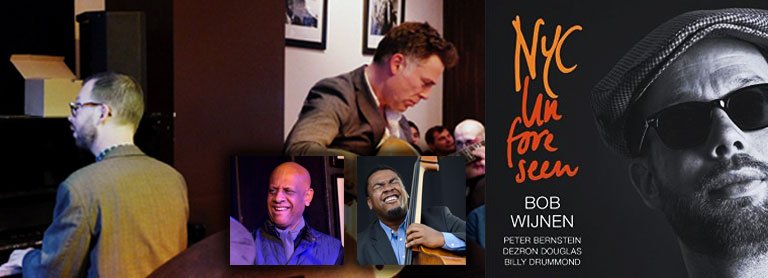Album Review: Sweet Sixty: Rob van Bavel’s Jubilant Jazz Celebration at 60

At the sweet age of sixty (the new fifty, so they say), Dutch jazz piano maestro Rob van Bavel is playing at the top of his game. His new album “Sweet Sixty” bursts forth as a joyous celebration of life, friendship, and music. In honor of his 60th birthday, van Bavel gathered an all-star lineup of fellow musicians and crafted a vibrant collection of tunes that swing hard, groove deep, and touch the heart. The result is a delightful jazz journey that has critics raving and listeners smiling from ear to ear.
“Sweet Sixty” isn’t just another album, it’s a heartfelt party on record. Subtitled “Celebrating Life with Friends and Music,” this project lives up to that motto in every bar and melody. Across its generous program of fourteen tracks, van Bavel invites many of his closest musical friends to join in the fun, creating an atmosphere of warmth and camaraderie that you can feel through the speakers. The energy is infectious; you can practically envision the grins exchanged in the studio as these top-notch players trade solos and grooves. It’s the sound of a master artist marking a personal milestone by doing what he loves most, making great music with great people.
A Milestone Birthday Album Filled with Friends
Van Bavel’s concept for “Sweet Sixty” was simple and beautiful: celebrate his 60th birthday by making music with his friends. The core of the album is built on van Bavel’s longtime trio, humorously nicknamed “The Ghost, The King and I”, consisting of Frans van Geest on upright bass (the “Ghost”), Vincent Koning on guitar (the “King”), and Rob van Bavel himself as the “I” on piano. This drum-less trio has been the pianist’s musical family for years, known for their telepathic interplay and swinging groove. They provide the tight, supple backbone on most of the tracks here, and their chemistry is palpable. Whether navigating a tender ballad or a brisk bebop line, the trio plays with effortless cohesion and class.

But what truly makes the album special is the extended family of guest artists, a who’s who of Dutch jazz talent, that van Bavel brought into the studio. Virtually every track features a special appearance, turning the record into a lively jam session and reunion of jazz greats. Trumpet and flugelhorn virtuoso Jan van Duikeren joins in, as does fellow trumpet star Rik Mol. Renowned tenor saxophonist Tom Beek brings his horn’s honeyed tone to the mix. On guitar alongside Koning, the brilliant Martijn van Iterson contributes his nimble fretwork. There are also stellar vocal cameos: jazz chanteuse Anna Serierse lends her voice on a couple of tunes, and the acclaimed Deborah J. Carter delivers a powerhouse vocal feature of her own. Each of these friends adds a unique flavor, yet the album remains cohesive, a testament to van Bavel’s inviting spirit and musical vision. You can sense the mutual respect and joy as these musicians collaborate. It’s as if Rob threw a big birthday jam, and we get to sit in on the highlights.
Swinging Through Jazz Classics and Surprises
The repertoire on “Sweet Sixty” is as celebratory as the occasion. Van Bavel has curated a delightful mix of jazz standards, pop surprises, and original compositions, all arranged to showcase spirited improvisation and the collective chemistry of the group. The album kicks off with a burst of excitement on “Raincheck”, the Billy Strayhorn bebop classic. Right from the downbeat, the listener is treated to bright, brassy flourishes from Jan van Duikeren’s flugelhorn and a dancing guitar line from Martijn van Iterson. Van Duikeren is on fire here, delivering horn lines that hit with brassy confidence and swing. It’s an opener that announces the album’s upbeat intentions with a grin.
From there, the journey continues through a variety of moods and jazz eras. Van Bavel tips his hat to the Great American Songbook with a luscious rendition of “Here’s That Rainy Day.” This Jimmy Van Heusen ballad becomes a trio showcase, just Rob’s piano, Koning’s guitar, and Marcel Serierse (another friend) on drums painting in subtle brush strokes. Their performance is beautifully restrained and lyrical, the kind of perfect execution that makes a well-worn standard feel fresh again. The piano and guitar gently trade phrases, showing off van Bavel’s touch for both elegance and emotion.

Ever the versatile performer, van Bavel also explores more modern and even unexpected song choices. One delightful highlight is “Games People Play,” the 1968 Joe South pop hit, here reinvented as a soulful jazz-blues number. Over a laid-back groove, Rik Mol’s trumpet growls and sings in a bluesy dialog with van Bavel’s piano. The band digs into the blues feeling, turning the pop tune into a cool swinging jam. It’s a perfect example of the album’s celebratory theme: taking songs from any source and making them swing in the joyful spirit of jazz.
Van Bavel’s own compositional skills shine as well, contributing some memorable originals to the program. Perhaps the most thrilling of these is “Faites Vos Jeux,” a track that truly lets the band cut loose. Written by Rob himself (the title is French for “place your bets”), this tune is an up-tempo romp that inspires fiery improvisations. Tenor saxophonist Tom Beek takes center stage on this number, unfurling a solo that builds from warm, melodic lines into blazing, full-throttle runs. You can practically hear the band whooping in the background as Beek’s saxophone soars with passionate intensity. Van Bavel matches that energy with percussive piano stabs and swirling runs of his own, pushing the band to fever-pitch swing. By the end of “Faites Vos Jeux,” you might find yourself catching your breath, it’s a glorious ride.
Throughout the album, van Bavel also finds ways to reflect on the passage of time and the celebration of life (in keeping with his birthday theme). There’s a subtle motif of “rain” that runs through several selections, perhaps a nod to life’s changing seasons or simply an affectionate joke about the Dutch weather. “The Rain Has Gone,” a gentle original co-written by Rob and vocalist Joy Misa, is a moment of introspection on the album. Sung with delicate feeling by Anna Serierse, it’s a hushed, contemplative piece, as if the storm has passed and now there’s a calm sunrise. Serierse’s voice is pure and soothing here, conveying hope and serenity. In contrast, Anna later returns to deliver a snappy, swinging take on the jazz evergreen “September in the Rain.” Backed by the grooving trio, she turns the 1930s standard into a playful celebration, scatting and phrasing with a smile. The juxtaposition of these two “rain” songs, one quiet and one exuberant, shows the dynamic emotional range that “Sweet Sixty” covers.

Even the legendary George Gershwin gets a nod on this record. Van Bavel, who has a known affinity for Gershwin’s music, includes “Our Love Is Here to Stay” and “How Long Has This Been Going On?” Both are rendered with loving care and a sense of fun. The band clearly relishes these timeless melodies. In fact, critics have called these two Gershwin interpretations “real jewels” of the album, glowing little gems tucked amid the playlist. Van Bavel’s piano leads the way, waltzing through “Our Love Is Here to Stay” with lyrical swing, and caressing the tender phrases of “How Long Has This Been Going On?” with heartfelt emotion. These classic tunes not only pay tribute to the past, but in the context of Rob’s birthday celebration, they underscore a theme: great music is eternal, and as long as there are friends to play it with, the love of jazz truly is here to stay.
Masterful Musicianship and Heartfelt Performances
What truly makes “Sweet Sixty” special is the masterful musicianship on display from Rob van Bavel and his collaborators. This album overflows with inspired solos, tight ensemble work, and the kind of musical conversations that can only happen between seasoned players who trust each other. Van Bavel himself is, of course, front and center, and he reminds us why he’s considered one of the finest jazz pianists in the Netherlands (and indeed, in Europe). Decades into his career, he plays with a vigor and finesse that many younger pianists would envy. Whether he’s sprinting through an up-tempo swing or tenderly voicing a ballad, Rob’s touch on the keys is confident and full of character. There’s a sparkling virtuosity in his playing, rapid-fire bop runs and clever reharmonizations aplenty, but there’s also bluesy soul and classical poise in the mix. At 60, he’s accumulated a world of musical influences, and he brings that full palette to the piano. Yet for all his technical brilliance, van Bavel never comes off as showy or overbearing; instead, he plays with joy and generosity, always encouraging the best out of his bandmates.

And those bandmates respond in kind. The interplay between the musicians is electric. You can hear smiles in the horn lines and conversations happening between the rhythm section and the soloists. For example, on “Game Changer,” an original tune that emerges as one of the album’s standout moments, the group reaches peak synergy. This track is aptly named, it shifts the album into overdrive. Rik Mol on flugelhorn and Tom Beek on tenor sax both deliver show-stopping solos, each spurring the other on. Mol’s flugelhorn solo starts warm and lyrical, then erupts into soaring high notes that dazzle; Beek answers with a tenor sax ride that is gutsy and adventurous, wailing in the upper register and dipping into a sultry growl at times. Beneath it all, van Bavel is comping hard on piano, urging the soloists forward with funky chord stabs and swinging basslines under his left hand. Bassist Frans van Geest anchors the groove with fat, walking bass lines, and one can imagine him nodding and swinging with excitement. By the time “Game Changer” hits its climax, the whole band is burning hot, locked into the kind of tight, spontaneous swing that only comes from seasoned pros having the time of their lives. It’s the kind of moment that encapsulates what Sweet Sixty is about, seasoned musicians pushing each other to new heights, all in the spirit of celebration.
Even in more relaxed tunes, the finesse is front and center. Take “On the Sunny Side of the Street,” that feel-good standard. Here the group doesn’t rush; they settle into a gentle, easy swing that truly feels like strolling in the sunshine. Martijn van Iterson’s guitar gets a turn to shine, and shine it does, his solo is a study in tasteful phrasing, each note like a sunbeam dancing off the pavement. Van Bavel comps softly underneath, letting the guitar do the talking, until he steps forward with a solo of his own that playfully quotes the melody and adds little blues inflections. It’s all so unforced and breezy. In moments like this, the album exudes a warm glow. You feel like you’re at a cozy jazz club, watching masters who don’t need to show off, they just converse through the music, finishing each other’s musical sentences.
A Triumphant Finale and Critical Acclaim
As Sweet Sixty nears its end, Rob van Bavel saves some of the best for last. The official closing track (before a little surprise) is “Devil’s Game,” a song co-written by van Bavel and vocalist Deborah J. Carter. And what a finale it is, a true showstopper that puts an exclamation point on the album’s celebratory spirit. Deborah J. Carter’s voice is simply marvelous here: she sings with a bold, soulful power that immediately commands attention. The tune itself has a sly, bluesy swagger, one can imagine it being performed in a New Orleans jazz hall with people clapping on the backbeat. Carter digs into the lyrics with gusto, her tone sassy and rich, while van Bavel rolls out a rollicking piano underpinning. The rest of the band joins in to raise the roof one more time, horns interjecting with sharp riffs and the rhythm section cooking with a deep groove. By the time “Devil’s Game” wraps up, you feel like you’ve experienced a proper climax to a grand jazz party. One reviewer aptly called this track “a beautiful closer to an extremely successful album”, and it’s easy to hear why. It’s the musical equivalent of a champagne toast, bubbly, satisfying, and leaving you a bit lightheaded with happiness.

But wait, just like at many great parties, there’s an encore! In a charming touch, Sweet Sixty includes a hidden track after the main program: the title piece “Sweet Sixty” itself. This brief solo piano coda is van Bavel’s parting gift to the listener. Unlisted on the CD cover, it comes as a delightful surprise. The piece “Sweet Sixty” is tender and introspective, as if Rob is reflecting on the journey that brought him to this moment. His piano sings softly, with a touch of nostalgia but also contentment. It lasts only a couple of minutes, but it’s enough to leave a lasting impression, a gentle musical thank-you note from the birthday boy to everyone who joined him on this album. As a listener, it feels like Rob van Bavel personally saying, “Thank you for celebrating with me.” It’s hard not to smile, maybe with a tear of joy, as the final notes fade away.
Unsurprisingly, critical praise for Sweet Sixty has been unanimous and glowing. Reviewers have been charmed by the album’s spirit and impressed by its musical excellence. Jazz writers have pointed out how van Bavel sounds rejuvenated and at peak form, even after decades in the scene. (Indeed, one critic marveled that van Bavel is “playing at the top of his game” at 60.) The album’s concept of celebration with friends has struck a chord, with critics noting the genuine camaraderie that comes through in the recording. They have applauded the varied song selection, from classic standards to modern twists, and how the album manages to be both nostalgic and freshly innovative. Particular tracks often singled out for praise include the high-octane “Game Changer” (frequently mentioned as an album highlight for its explosive group interplay) and the rousing “Devil’s Game” finale, which one reviewer described as the cherry on the cake of this musical feast. The inclusion of so many guest stars could have made the album feel scattered, but instead commentators have noted how cohesive and organic the whole journey feels, a testament to van Bavel’s leadership and the tight bond among these musicians. In short, Sweet Sixty has been hailed as a triumph. It’s a resounding affirmation that jazz, when played with love and joy, only gets better with age.
A Joyous Jazz Journey for All
In “Sweet Sixty,” Rob van Bavel has gifted us not just an album, but an experience. It’s a celebration you can listen to, a jubilant journey through the sounds of jazz, guided by a pianist at his creative apex and accompanied by friends who share his passion. The album captures that elusive magic that happens when musicians genuinely enjoy themselves: you can hear laughter in the notes, feel the years of friendship and shared stories behind each exchange of melodies. It invites the listener into the circle, to tap their foot, nod along, and be part of the fun.
By the time you finish the album (and wipe that grin off your face), you might just agree with the critics and fans who have been singing its praises. Sweet Sixty is a *swinging success from start to finish. It celebrates Rob van Bavel’s outstanding career and milestone birthday in the best way possible, through music that is lively, heartfelt, and timeless. The musicianship is top-tier, the song choices are delightful, and the mood is irresistibly positive. This is an album that embraces the joy of jazz, reminding us why we fell in love with this music in the first place.
Rob van Bavel has proven that turning sixty can be sweet indeed. If this album is any indication, he’s not slowing down one bit, in fact, he’s having the time of his life and inviting all of us to join the party. Sweet Sixty is a toast to life’s milestones and to the friends who make those moments shine. So raise a glass (or better yet, play this record loud), and let the infectious swing and soulful melodies of Rob van Bavel’s birthday bash wash over you.
Here’s to a jazz master at 60, still swinging strong, still spreading joy, and sounding absolutely spectacular. Cheers, Rob, and happy Sweet Sixty!
This Album review is created by Peter Antheunis.






Responses